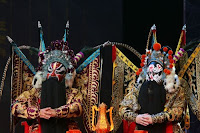KNOWING that i'm basically an english educated person, "ang mo sai" (which means english shit • a saying from chinese-ed people), and i totally not understand what the show is all about.. i guess i developed this interest way back from my grandma. I still recall those days when she brought me to see these shows during the ghost festival. I would sit there for hours and not leave my sit. Wierd huh.. well i'm always into these chinese culture stuffs.
Beijing opera or Peking opera (simplified Chinese: 京剧; traditional Chinese: 京劇; pinyin: Jīngjù) is a form of traditional Chinese theatre which combines music, vocal performance, mime, dance and acrobatics. It arose in the late 18th century and became fully developed and recognized by the mid-19th century.[1] The form was extremely popular in the Qing Dynasty court and has come to be regarded as one of the cultural treasures of China.[2] Major performance troupes are based in Beijing and Tianjin in the north, and Shanghai in the south.[3] The art form is also enjoyed in Taiwan, where it is known as Guoju (國劇; pinyin: Guójù). It has also spread to other countries such as the United States and Japan.[4]
Beijing opera features four main types of performers. Performing troupes often have several of each variety, as well as numerous secondary and tertiary performers. With their elaborate and colorful costumes, performers are the only focal points on Beijing opera's characteristically sparse stage. They utilize the skills of speech, song, dance, and combat in movements that are symbolic and suggestive, rather than realistic. Above all else, the skill of performers is evaluated according to the beauty of their movements. Performers also adhere to a variety of stylistic conventions that help audiences navigate the plot of the production.[5] The layers of meaning within each movement must be expressed in time with music. The music of Beijing opera can be divided into the Xipi and Erhuang styles. Melodies include arias, fixed-tune melodies, and percussion patterns.[6] The repertoire of Beijing opera includes over 1,400 works, which are based on Chinese history, folklore, and, increasingly, contemporary life.[7]
In recent years, Beijing opera has attempted numerous reforms in response to sagging audience numbers. These reforms, which include improving performance quality, adapting new performance elements, and performing new and original plays, have met with mixed success. Some Western works have been adopted as new plays, but a lack of funding and an adverse political climate have left Beijing opera's fate uncertain as the form enters the 21st century.[8]






No comments:
Post a Comment